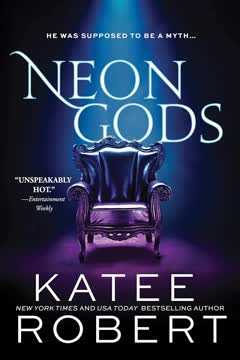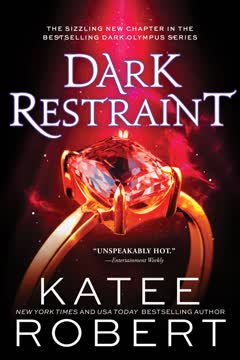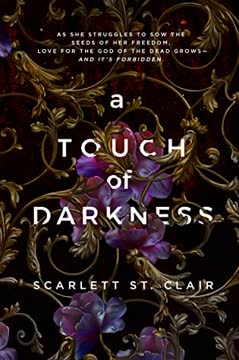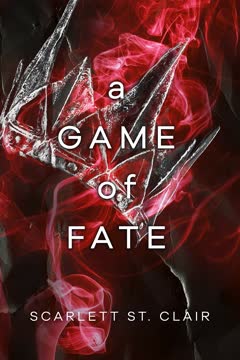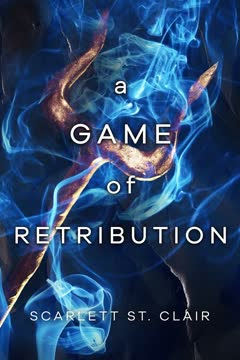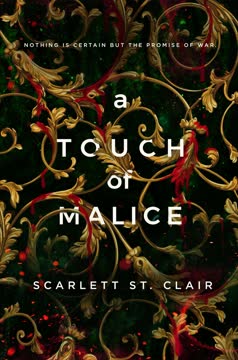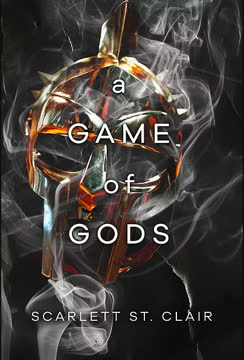Plot Summary
Olympus's Poisoned Heartbeat
In the city of Olympus, power is everything, and the ruling Thirteen families hold it with a vice grip. Cassandra Gataki, once from a disgraced legacy family, now works as executive assistant to Apollo, the city's spymaster. She's learned to survive by keeping her head down, protecting her younger sister, and never trusting anyone. But the city's heart beats with secrets, and the recent arrival of Minos and his mysterious family threatens to upend the fragile balance. Cassandra's cynicism is her armor, but even she can sense the storm gathering on the horizon, one that will force her to choose between safety and the truth.
Cassandra's Reluctant Loyalty
Cassandra's life is a careful balancing act: she supports her sister Alexandra, keeps her distance from the Thirteen, and maintains a prickly exterior to ward off pity and suspicion. Her job with Apollo is a lifeline, but it's also a daily reminder of the power she's lost and the dangers of getting too close to Olympus's elite. Despite her best efforts, she can't help but care for Apollo, whose kindness and integrity set him apart. But loyalty in Olympus is a double-edged sword, and Cassandra knows that even the smallest misstep can have deadly consequences.
Apollo's Calculated Kindness
Apollo, Keeper of Lore and Olympus's spymaster, is a man who wields information like a weapon but never abuses his power. He's haunted by the city's corruption and the knowledge that the barrier protecting Olympus from the outside world is failing. His attraction to Cassandra is a secret he guards fiercely, unwilling to risk her safety or agency. When Minos arrives, offering information about a shadowy enemy in exchange for citizenship, Apollo is forced to play a dangerous game—one that will test his principles, his loyalty, and his heart.
Bargains and Boundaries
When Minos invites Apollo to a weeklong house party, Apollo realizes he needs Cassandra's sharp instincts to navigate the treacherous social waters. Cassandra initially refuses, unwilling to become a pawn in Olympus's games or risk her reputation. But Zeus, the city's ruler, ups the stakes: he offers Cassandra a fortune and safe passage out of Olympus for her and her sister if she helps uncover Minos's true motives. Reluctantly, Cassandra agrees, setting strict boundaries—this is a job, not a romance, and she will not be anyone's victim.
The Party Invitation Trap
Apollo and Cassandra arrive at Minos's country estate, where the guest list reads like a who's who of Olympus's power players. The party is a powder keg: old rivalries, new alliances, and hidden agendas simmer beneath the surface. Cassandra and Apollo must pretend to be lovers, sharing a room and a bed, all while searching for evidence of Minos's true intentions. The house itself is a labyrinth of secrets, and every interaction is a potential threat. The line between performance and reality begins to blur as danger draws closer.
Playing Lovers, Playing Games
To sell their cover, Apollo and Cassandra must act the part of a couple in love—public displays of affection, intimate dinners, and whispered conversations. The charade is complicated by their genuine attraction, which simmers beneath every touch and glance. As they navigate the party's elaborate games and social minefields, they gather clues about Minos's plans. But the emotional stakes rise as well, and both must confront the possibility that their feelings are no longer just an act. Trust, once a luxury, becomes a necessity.
Masks at the Dryad
Their first public date at the elite restaurant, the Dryad, is a test of their ability to perform under Olympus's watchful eyes. Gossip swirls, and Minos himself makes an appearance, sizing up Apollo and Cassandra. The evening is a dance of flirtation and strategy, with every gesture scrutinized and every word weighed. The chemistry between Apollo and Cassandra is undeniable, but both are haunted by the knowledge that in Olympus, love can be as dangerous as hate. The night ends with a staged kiss that feels all too real, leaving both shaken and wanting more.
The House of Secrets
At Minos's estate, Apollo and Cassandra discover the house is riddled with surveillance—cameras, microphones, and hidden passageways. They must outwit Minos's security while maintaining their cover, all the while mapping the house and searching for evidence. The party's games—mazes, hide-and-seek, and blindman's bluff—are more than entertainment; they're opportunities for Minos to test, manipulate, and divide his guests. As alliances shift and suspicions grow, Cassandra's instincts tell her that something far more sinister is at play.
Dangerous Intimacies
Forced proximity and the constant threat of exposure push Apollo and Cassandra closer together. Their fake relationship becomes real in the shadows—shared confessions, stolen kisses, and nights spent tangled in each other's arms. But intimacy is a double-edged sword. For Cassandra, vulnerability is terrifying; for Apollo, the fear of losing her is paralyzing. As they let down their guards, they become each other's weakness—and each other's strength. But in Olympus, love is never safe, and every secret shared is a potential weapon.
The Maze and the Minotaur
Minos's party games escalate in intensity and danger. In a midnight maze, alliances are tested and old wounds reopened. Cassandra is confronted by the Minotaur, Minos's brutal foster son, and barely escapes with Apollo's intervention. The threat is no longer abstract—someone at the party is willing to kill. When a guest is attacked and left for dead, the illusion of safety shatters. The house becomes a battleground, and Cassandra realizes that the real game is survival. The Minotaur's warning is clear: in Olympus, no one is safe.
Schemes in the Shadows
As the party unravels, Cassandra uncovers a web of betrayal. Hermes, the trickster among the Thirteen, is revealed to be working with Minos, trading secrets for her own mysterious ends. Minos's true plan emerges: he intends to exploit an ancient assassination clause in Olympus's laws, allowing him—or his sons—to claim a seat among the Thirteen through murder. The party was always a trap, designed to gather the city's rulers in one place and strike. Cassandra and Apollo must race against time to warn the others and prevent a coup.
The Price of Survival
Violence erupts as Minos's sons make their move. In a brutal confrontation, Hephaestus, one of the Thirteen, is murdered by Theseus, who invokes the assassination clause and claims the title. Cassandra, forced to witness the act, is traumatized but resolute. The party descends into chaos as the guests realize the true stakes. Apollo, battered and bloodied, must protect Cassandra and help the survivors escape. The cost of survival is high—innocence lost, trust shattered, and the city's future thrown into uncertainty.
Betrayals and Revelations
In the aftermath, the survivors regroup and reckon with the consequences. The assassination clause, long kept secret, is now public knowledge, and the city teeters on the brink of anarchy. Hermes's betrayal is revealed, but her motives remain murky—she claims to act for Olympus, but her methods are ruthless. Cassandra confronts the reality that even those she once trusted are capable of terrible things. The lines between friend and foe blur, and the only certainty is that nothing will ever be the same.
Blood on the Carpet
The violence at Minos's party leaves physical and emotional scars on everyone involved. Apollo and Cassandra, both wounded, retreat to his home to recover. The city reels from the news of Hephaestus's murder and the revelation of the assassination clause. The Thirteen convene to decide Theseus's fate, but the damage is done—their power is no longer absolute, and the threat of further violence looms. For Cassandra, the trauma of witnessing murder reopens old wounds, but Apollo's steadfast presence offers a fragile hope.
The Clause Awakened
With the assassination clause now public, Olympus faces an unprecedented crisis. The city's power structure is destabilized, and every member of the Thirteen is a potential target. The threat of Minos's mysterious benefactor—an outside force seeking to exploit the chaos—hangs over everything. The Thirteen scramble to contain the fallout, but trust is in short supply. Cassandra and Apollo, caught in the crossfire, must decide where their loyalties truly lie and what they are willing to sacrifice for each other and for Olympus.
Aftermath and Reckoning
In the days following the party, Cassandra and Apollo grapple with the consequences of their choices. Cassandra's sister, Alexandra, urges her to put herself first for once, challenging her to choose happiness over fear. Apollo, wracked with guilt, tries to protect Cassandra even as he faces the city's wrath. The Thirteen are forced to accept Theseus as the new Hephaestus, and the city braces for further upheaval. In the quiet moments, Cassandra and Apollo confront their love for each other and the possibility of a future together.
Choosing to Stay
As Olympus teeters on the edge of chaos, Cassandra faces a choice: flee the city and start anew, or stay and fight for the people—and the man—she loves. Encouraged by her sister and her own hard-won courage, she chooses to stay, determined to help Apollo and the city weather the coming storm. Their love, forged in danger and tested by betrayal, becomes a beacon of hope in a city built on secrets. Together, they face an uncertain future, but for the first time, Cassandra chooses to swim in the depths rather than run from them.
Characters
Cassandra Gataki
Cassandra is a woman forged in the fires of loss and betrayal. Once a member of a powerful legacy family, she was cast out after her parents' failed coup and subsequent deaths. She's fiercely protective of her younger sister, Alexandra, and has built walls of cynicism and sarcasm to keep the world at bay. As Apollo's executive assistant, she's indispensable—sharp, observant, and unafraid to speak truth to power. Psychologically, Cassandra is driven by a need for control and a terror of vulnerability; she fears both the city's cruelty and her own capacity for love. Over the course of the story, she's forced to confront her trauma, her desires, and her capacity for trust. Her relationship with Apollo is both a source of strength and a terrifying risk, ultimately leading her to choose hope over fear.
Apollo
Apollo is the Keeper of Lore, Olympus's spymaster, and a member of the Thirteen. He's a man who wields information with surgical precision but refuses to abuse his power. Haunted by the city's corruption and the knowledge that the barrier protecting Olympus is failing, he's both shield and sword for those he cares about. His attraction to Cassandra is deep and abiding, but he's terrified of hurting her or crossing ethical lines. Apollo's psychological complexity lies in his struggle between duty and desire, control and vulnerability. He's a caretaker by nature, but his greatest fear is failing those he loves. Through his relationship with Cassandra, he learns to accept help, embrace vulnerability, and fight not just for the city, but for his own happiness.
Alexandra Gataki
Alexandra is Cassandra's younger sister and the reason for many of Cassandra's sacrifices. She's sweet, optimistic, and determined to make her own way in Olympus, despite the family's disgrace. Alexandra's innocence is both a shield and a source of tension—Cassandra wants to protect her from the city's darkness, but Alexandra insists on living her own life. Her confrontation with Cassandra late in the story is a turning point, challenging her sister to choose happiness and agency over martyrdom. Alexandra represents hope, the possibility of healing, and the importance of self-determination.
Minos
Minos is the enigmatic patriarch of a new family in Olympus, bringing with him secrets, wealth, and a dangerous agenda. He's charming, cunning, and utterly ruthless, willing to exploit ancient laws and human weaknesses to achieve his goals. Minos's psychological profile is that of a predator—he tests, manipulates, and divides, always seeking leverage. His relationship with his children is transactional, and his alliance with Hermes reveals a willingness to betray anyone for power. Minos is the catalyst for the story's central crisis, embodying the threat of both external and internal corruption.
Hermes
Hermes is a member of the Thirteen, known for her cunning, unpredictability, and penchant for secrets. She's both friend and former lover to Cassandra, and her motives are always in question. Hermes's psychological complexity lies in her ability to play multiple sides, always keeping her true intentions hidden. She claims to act for Olympus's good, but her methods are ruthless and her alliances shifting. Her betrayal is both personal and political, forcing Cassandra to confront the limits of trust and the dangers of ambiguity.
Theseus
Theseus is Minos's foster son, a man marked by physical and emotional scars. He's a formidable fighter, driven by a need to prove himself and claim power. Psychologically, Theseus is both tool and agent—he enacts Minos's will but also pursues his own ambitions. His violence is both a weapon and a mask, hiding deeper insecurities and resentments. His murder of Hephaestus and invocation of the assassination clause make him a symbol of the new, dangerous order threatening Olympus.
Ariadne
Ariadne is Minos's daughter, caught between loyalty to her family and her own moral compass. She's soft, kind, and deeply unhappy with her father's schemes. Ariadne's psychological struggle is one of agency—she wants to help Apollo and Cassandra but is terrified of the consequences. Her small acts of resistance and eventual cooperation make her a potential ally, but her fear and trauma are ever-present. Ariadne represents the collateral damage of power games and the possibility of redemption.
Zeus
Zeus is the current leader of Olympus, a man thrust into power and struggling to maintain order. He's pragmatic, often cold, and willing to make hard bargains for the city's survival. Zeus's psychological burden is the weight of legacy—he must live up to his father's reputation while forging his own path. His relationship with Apollo is complex, marked by mutual respect and occasional conflict. Zeus is both Cassandra's employer and her adversary, embodying the city's contradictions.
Dionysus
Dionysus is a member of the Thirteen, known for his wit, charm, and love of excess. Beneath the surface, he's a survivor, navigating Olympus's dangers with humor and cunning. Dionysus's psychological complexity lies in his ability to mask pain with laughter and to see through the city's facades. He's a friend to Cassandra and a potential ally, but his true loyalties are always in question. Dionysus represents the resilience and adaptability required to survive in Olympus.
Hephaestus
Hephaestus is a member of the Thirteen, marked by physical injury and political isolation. He's a symbol of the old order—powerful but vulnerable, respected but resented. His murder by Theseus is both a personal tragedy and a political earthquake, signaling the end of an era and the beginning of chaos. Hephaestus's psychological profile is one of pride, bitterness, and resignation; his fate is a warning to all who believe themselves untouchable.
Plot Devices
The Assassination Clause
The assassination clause is a little-known law in Olympus's founding documents: if someone kills a member of the Thirteen (excluding the legacy titles), they may claim the title for themselves. This device is the story's ticking time bomb, a secret that, once revealed, destabilizes the city's entire power structure. It serves as both literal and metaphorical threat—violence as a means to power, the fragility of order, and the dangers of hidden truths. The clause's revelation is foreshadowed through Cassandra's family history and Minos's machinations, and its activation marks the story's climax.
Fake Relationship / Forced Proximity
Apollo and Cassandra's fake relationship is both a plot device and a crucible for character development. Forced to share a room, a bed, and public displays of affection, their act blurs into reality, allowing both to confront their fears and desires. The device enables exploration of trust, vulnerability, and the line between performance and authenticity. It also heightens the stakes—what begins as a strategic alliance becomes a genuine love story, with all the attendant risks.
House Party as Microcosm
Minos's weeklong house party is a classic closed-circle setting, bringing together all the major players in a confined, surveilled space. The party's games and rituals serve as both entertainment and battleground, allowing for shifting alliances, secret meetings, and escalating tension. The house itself, with its hidden rooms and surveillance, is a character in its own right—a labyrinth of secrets and dangers. The party structure enables the narrative to compress time, heighten stakes, and force confrontations.
Dual POV and Narrative Structure
The story alternates between Cassandra and Apollo's points of view, allowing readers to experience both the external plot and the internal emotional arcs. This structure deepens the psychological complexity, revealing the fears, desires, and rationalizations that drive each character. The dual POV also enables dramatic irony—readers know more than either character alone, heightening tension and empathy.
Foreshadowing and Symbolism
The narrative is rich with foreshadowing—Cassandra's family history, the city's obsession with power, the cracks in the barrier, and the party's escalating games all hint at the coming crisis. Symbolism abounds: the maze as a metaphor for the city's moral complexity, the surveillance as a stand-in for paranoia and vulnerability, and the act of swimming (or drowning) as a motif for agency and survival.
Analysis
Radiant Sin reimagines Greek myth as a contemporary tale of power, trauma, and the possibility of healing. At its core, the novel is a meditation on the costs of survival in a corrupt system—how cynicism, loyalty, and love can be both shields and shackles. Cassandra's journey from self-protective isolation to vulnerable connection is mirrored by Apollo's struggle to balance duty and desire. The story interrogates the dangers of hidden laws and unchecked ambition, using the assassination clause as both literal threat and metaphor for the violence inherent in systems of power. The fake relationship trope is subverted, becoming a vehicle for genuine intimacy and mutual rescue. Ultimately, the novel argues that hope is an act of defiance—that choosing to stay, to fight, and to love in the face of chaos is itself a radical act. In a world where trust is dangerous and survival is never guaranteed, Radiant Sin offers a vision of love as both sanctuary and revolution.
Last updated:
Review Summary
Radiant Sin receives mixed reviews, with an average rating of 3.78 out of 5. Readers appreciate the fake dating trope, forced proximity, and character development. Some enjoy the murder mystery plot, while others find it lacking. The book is praised for its steamy scenes and diverse representation. Critics note repetitive dialogue and inconsistent world-building. Many readers express excitement for the series' overall plot progression and eagerly anticipate future installments, particularly hoping for stories featuring Hermes, Dionysus, and Zeus.

